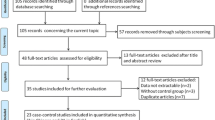Abstract
NAD(P)H: quinone oxidoreductase 1 (NQO1) is an important enzyme which can catalyze the two-electron reduction of quinoid compounds into hydroquinones. NQO1 Pro187Ser polymorphism can change the enzymatic activity of NQO1, and it has been proposed to be associated with risk of esophageal cancer. We performed a meta-analysis to examine the association between NQO1 Pro187Ser polymorphism and esophageal cancer. Odds ratio (OR) with a 95 % confidence interval (95 % CI) was used to assess the association. Twelve case–control studies with 1,725 cases with esophageal cancer and 2,341 controls were finally included in the meta-analysis. Overall, there was an obvious association between NQO1 Pro187Ser polymorphism and esophageal cancer (allele model: OR = 1.24, 95 % CI 1.06–1.46, P OR = 0.009; homozygote model: OR = 1.59, 1195 % CI 1.10–2.30, P OR = 0.013; dominant model: OR = 1.31, 95 % CI 1.05–1.64, P OR = 0.018). In the subgroup analysis by ethnicity, there was an obvious association between NQO1 Pro187Ser polymorphism and esophageal cancer in Asians but not in Caucasians. Therefore, the meta-analysis suggests that NQO1 Pro187Ser polymorphism is associated with esophageal cancer risk.




Similar content being viewed by others
References
Enzinger PC, Mayer RJ. Esophageal cancer. N Engl J Med. 2003;349:2241–52.
Fitzgerald RC. Molecular basis of Barrett’s oesophagus and oesophageal adenocarcinoma. Gut. 2006;55:1810–20.
Maley CC. Open questions in oesophageal adenocarcinogenesis. Gut. 2007;56:897–8.
Lao-Sirieix P, Caldas C, Fitzgerald RC. Genetic predisposition to gastro-oesophageal cancer. Curr Opin Genet Dev. 2010;20:210–7.
Dinkova-Kostova AT, Talalay P. NAD(P)H:Quinone acceptor oxidoreductase 1 (NQO1), a multifunctional antioxidant enzyme and exceptionally versatile cytoprotector. Arch Biochem Biophys. 2010;501:116–23.
Siegel D, Yan C, Ross D. NAD(P)H:Quinone oxidoreductase 1 (NQO1) in the sensitivity and resistance to antitumor quinones. Biochem Pharmacol. 2012;83:1033–40.
Guha N, Chang JS, Chokkalingam AP, Wiemels JL, Smith MT, Buffler PA. NQO1 polymorphisms and de novo childhood leukemia: a huge review and meta-analysis. Am J Epidemiol. 2008;168:1221–32.
Dougherty D, Garte S, Barchowsky A, Zmuda J, Taioli E. NQO1, MPO, CYP2E1, GSTT1 and GSTM1 polymorphisms and biological effects of benzene exposure—a literature review. Toxicol Lett. 2008;182:7–17.
Yang FY, Guan QK, Cui YH, Zhao ZQ, Rao W, Xi Z. NAD(P)H quinone oxidoreductase 1 (NQO1) genetic C609T polymorphism is associated with the risk of digestive tract cancer: a meta-analysis based on 21 case–control studies. Eur J Cancer Prev. 2012;21:432–41.
Hamajima N, Matsuo K, Iwata H, Shinoda M, Yamamura Y, Kato T, et al. NAD(P)H: quinone oxidoreductase 1 (NQO1) C609T polymorphism and the risk of eight cancers for Japanese. Int J Clin Oncol. 2002;7:103–8.
Zhang J, Schulz WA, Li Y, Wang R, Zotz R, Wen D, et al. Association of NAD(P)H: quinone oxidoreductase 1 (NQO1) C609T polymorphism with esophageal squamous cell carcinoma in a german caucasian and a northern chinese population. Carcinogenesis. 2003;24:905–9.
Zhang JH, Li Y, Wang R, Sarbia M, Guo W, Wen DG, et al. The NAD(P)H: quinone oxidoreductase 1 C609T polymorphism and susceptibility to esophageal cancer. Zhonghua Yi Xue Yi Chuan Xue Za Zhi. 2003;20:544–6.
von Rahden BH, Stein HJ, Langer R, von Weyhern CW, Schenk E, Doring C, et al. C609t polymorphism of the NAD(P)H: quinone oxidoreductase i gene does not significantly affect susceptibility for esophageal adenocarcinoma. Int J Cancer. 2005;113:506–8.
Feng X, Li Z, Wang L, Zhang J, Lu Z. Study on the relationship between polymorphisms of NQO1 gene and susceptibility to esophageal cancer. Chinese journal of disease control & prevention. 2008;12:112–4.
Marjani HA, Biramijamal F, Rakhshani N, Hossein-Nezhad A, Malekzadeh R. Investigation of NQO1 genetic polymorphism, NQO1 gene expression and PAH-DNA adducts in ESCC. A case–control study from iran. Genet Mol Res. 2010;9:239–49.
Umar M, Upadhyay R, Kumar S, Ghoshal UC, Mittal B. Null association of NQO1 609C > T and NQO2-3423G > A polymorphisms with susceptibility and prognosis of esophageal cancer in north Indian population and meta-analysis. Cancer Epidemiol. 2012;36:e373–379.
Higgins JP, Thompson SG, Deeks JJ, Altman DG. Measuring inconsistency in meta-analyses. BMJ. 2003;327:557–60.
Mantel N, Haenszel W. Statistical aspects of the analysis of data from retrospective studies of disease. J Natl Cancer Inst. 1959;22:719–48.
DerSimonian R, Laird N. Meta-analysis in clinical trials. Control Clin Trials. 1986;7:177–88.
Egger M, Davey Smith G, Schneider M, Minder C. Bias in meta-analysis detected by a simple, graphical test. BMJ. 1997;315:629–34.
Sarbia M, Bitzer M, Siegel D, Ross D, Schulz WA, Zotz RB, et al. Association between NAD(P)H: quinone oxidoreductase 1 (NQ01) inactivating C609T polymorphism and adenocarcinoma of the upper gastrointestinal tract. Int J Cancer. 2003;107:381–6.
Zhang WC, Yin LH, Pu YP, Liang GY, Hu X, Liu YZ, et al. Relationship between quinone oxidoreductase1 gene ns-cSNP and genetic susceptibility of esophageal cancer. Zhonghua Yu Fang Yi Xue Za Zhi. 2006;40:324–7.
Zhou Y, Chen H, Shi X, Zhou Z, Li G, Pan P, et al. A case–control study on the polymorphisms of NQO1 and susceptibility of esophageal cancer. Bulletin of Chinese cancer. 2006;15:659–63.
di Martino E, Hardie LJ, Wild CP, Gong YY, Olliver JR, Gough MD, et al. The NAD(P)H: quinone oxidoreductase i C609T polymorphism modifies the risk of Barrett esophagus and esophageal adenocarcinoma. Genet Med. 2007;9:341–7.
Malik MA, Zargar SA, Mittal B. Role of NQO1 609C > T and NQO2-3423 G > A gene polymorphisms in esophageal cancer risk in Kashmir Valley and meta analysis. Mol Biol Rep. 2012;39:9095–104.
Lajin B, Alachkar A. The NQO1 polymorphism C609T (pro187ser) and cancer susceptibility: a comprehensive meta-analysis. Br J Cancer 2013. 2013. doi:10.1038/bjc.2013.357.
Wang Y, Zhang G, Luo Y. Association between NQO1 C609T polymorphism and colorectal cancer risk. Tumour Biol. 2013. doi:10.1007/s13277-013-0993-7.
Conflicts of interests
None
Author information
Authors and Affiliations
Corresponding author
Rights and permissions
About this article
Cite this article
Liu, K., Tian, H., Yu, KZ. et al. Association between NQO1 Pro187Ser polymorphism and esophageal cancer: a meta-analysis. Tumor Biol. 35, 2063–2068 (2014). https://doi.org/10.1007/s13277-013-1273-2
Received:
Accepted:
Published:
Issue Date:
DOI: https://doi.org/10.1007/s13277-013-1273-2




